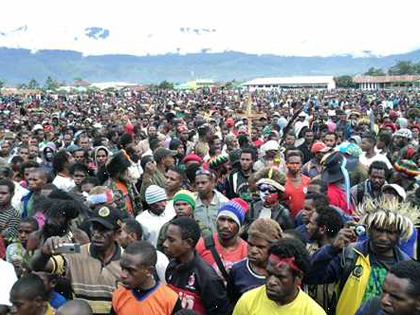
Thousands taking part in a Papuan rally supporting a referendum on independence in August. Photo: ETAN
Pacific Scoop:
Report – By Bintang Papua in Jayapura
The Third Papuan People’s Congress opened in Jayapura yesterday and took place in a field in the open air – after failing to get permission to use either the UNCEN auditorium, or GOR, the sports stadium, in the Papuan capital.
Selpius Bobii, chairman of the congress, said it would open on Lapangan Sakeus (Sakeus Field). It is a decade since the last congress.
He said the opening would take place as planned with communal prayers, followed by a seminar which may or may not be addressed by a speaker from the central government.
The format of the congress would be more or less the same as previous congresses – a seminar, followed by discussions and a plenary session.
The speakers would include a spokesperson from the NGO Foker, Septer Manufandu, church leaders, Rev Benny Giay, Rev Socrates S. Yoman and Rev Yemima Krey.
The theme of the congress is as previously announced: “To uphold the basic rights of the Papuan people now and in the future.”
Bobii said that the participants have come from kampungs throughout the territory who were paying their own way; they would convey their opinions about what they feel.
Adopt decisions
“Our task is only to accommodate them and facilitate the congress. They will speak about the situation in their own regions and will adopt decisions and decide what they need to do to implement these decisions.”
He also conveyed thanks to the central government for giving its blessing to the event.
“We also convey our thanks to the community in general for their participation, and for their help in ensuring that this event takes place in a conducive situation,” he said.
Meanwhile groups who oppose the congress also expressed their thoughts.
The chairman of the DPD (central council) of Garuda Indonesia Komando, Richard Kabarek, whose parents and grandparents are from Bali and Java, expressed the hope that the congress would discuss the situation of the Papuan people and how they can improve their living conditions.
As for the top officials of the provincial and local administrations, he said: “We hope that they will stop doing things that create panic and confusion among the population.”
‘We too need help’
Kabarek said: “We are the younger generation and we acknowledge that there are discrepancies between us and the Papuan people. We are from the Republic of Indonesia – NKRI , we too need help, we need education and we need decent living conditions.”
He appealed to the central government “to draw up a programme of development so as to ensure that the people living in the interior experience improvements in their living conditions”.
He also expressed the hope that the Third Papuan Congress would adopt decisions that would not be harmful to their own situation and to the community in general.
Another person who expressed his views was Yusak Pakage who decided not to attend the congress.
He said he had attended the Second Congress in 2000 when the situation was different from the present day. On that occasion, the central government supported the congress and also provided financial assistance and security.
Much depends on those who were given a mandate by the second congress, said Pakage: “Many things have happened since then for which they are responsible. Those who are given a mandate this time should report their activities to the people and should not do anything detrimental to the people.
OPM opposition
“We also know that there are those who are for and those who are against this congress, in particular the TPN/OPM led by Lambert Pekikir, who is
chairman of the Revolutionary Council of West Papua.”
Speaking on behalf of the TPN/OPM, Pekikir said: “The Papuan people should not be influenced by the organisation, the congress or whatever form of dialogue is agreed. It should not result in the Papuan people becoming victims because of the differences of opinons, between the ‘pros’ and the ‘contras’.”
Source: Bintang Papua, abridged in translation by TAPOL. Tapol notes that when referring to the second congress in 2000, no mention is made to the fact that this took place during the presidency of Abdurahman Wahid – Gus Dur – who was sympathetic towards the Papuan people – which may well have been one of the reasons why his presidency ended with his impeachment.
